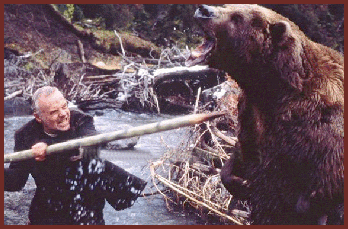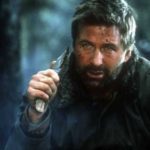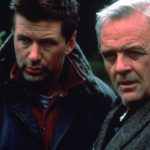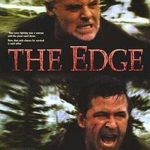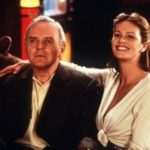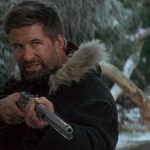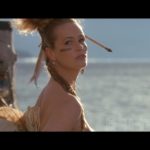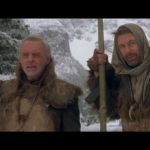Not a week after The Revenant and I’m reviewing another tale of survival, and, incredibly enough, another fight with a grizzly bear. Where Leo went down in two, this titanic struggle results victory by two falls to one in the 6th – but not to the bear. The difference? Where the bear in The Revenant is a hugely realistic CGI, the Edge (original title: Bookworm) employs a real life bear, yes indeedy. Not only that, but the bear is the star of the show. Look up Bart the Bear if you don’t believe me!
For those who don’t know this cinematic legend, 9ft 6in Bart died in 2000 at the age of 23, having appeared in a whole bunch of movies. To get a measure of what a fine character actor Bart was, his portrayal of a Grizzly is authentic to a tee – remarkable since he was actually a Kodiak bear (a feat comparable to American Renée Zellweger playing the very English Bridget Jones, maybe?)
Anyway, this movie is scripted by the legendary David Mamet, and is therefore much wordier than The Revenant but minus the Glengarry Glen Ross-style expletives (gotta get the family audiences in!) While Mamet uses various devices to apply erudite meaning and symbolism through the script, it has to be said this is probably not his finest work. I’m guessing but Bart probably improvised his lines.
The human contingent is led by billionaire Charles Morse, played as a reflective and understated know-it-all by erstwhile Oscar-winning Hannibal Lecter Sir Anthony Hopkins. Hopkins is accompanied on a fashion shoot in Alaska by his model wife Mickey (model Elle Macpherson), wiseguy arsehole photographer Bob Green (wiseguy Alec Baldwin, but I’ll leave you to judge the rest from his reputation), assistant Stephen (Harold Perrineau) and assorted crew.
The proprietor of the log cabin where they are staying (L Q Jones) reminds me of Jack Palance‘s deadpan turn in City Slickers, not that they stay there too long. Why? Because Bob insists he, Stephen and Charles fly 80 miles north to a cabin on a lake owned by Jack Hawk (Gordon Tootoosis), whom he wants in the photo shoot. Jack’s not home, out on a bear hunt, so they fly to his last known base, hit a flock of migrating geese, crash and, bob’s your uncle, are marooned in the middle of glorious Bart country. That is, mountains, woods, lakes, pastures, stuff you’d love on your postcards home…. but is actually Canada putting in a fine job of standing in for Alaska, which presumably didn’t offer the producers the same financial incentives.
So Charles uses his theoretical knowledge to help them survive and make their way back, things go wrong, poor Stephen gets eaten by Bart (ie. the most junior and expendable cast member available), Charles and Bob eventually get revenge on Bob, make it back to Jack’s empty cabin (nobody locks their doors out in the wilderness), just in time for the melodramatic Mametian human intrigue to start. I won’t say any more, but you will probably guess the outcome and who survives – and how it ends too. But I think you will almost certainly find it contrived and pointless.
What’s that? You want to know more about the survival story? After all, that was the mainstay of The Revenant, and the cutting edge (no pun intended) that made it authentically credible. Not so in this Edge! Director Lee Tamahori will doubtless consider it a worthwhile part of his back catalogue, though has to be said there are several scenes that are unintentionally laughable, notably some reactions that rank among the hammiest you’ve ever seen.
Oh, and plenty more scenes that are hoary clichés of survival films, plus continuity errors that would not convince a 5-year old. For example, Morse is twice submerged in water and thoroughly drenched – yet in each subsequent scene he is dry as a bone, as are the matches that were in Bob’s jacket!
In fact, all the guys remains beautifully coiffed, beards neatly trimmed, clean and warmly dressed throughout their ordeal. Their fires materialise without any apparent difficulty and never seem to go out, as if fuelled by off-screen gas bottles or at least a crew gathering wood while they pontificate to camera. But then cast and crew probably had warm and pleasant trailers, plus a fully equipped catering team offering hot drinks and meals around the clock.
Until Bart is flambéed the boys are not seen eating at all, yet don’t look especially hungry or thirsty, that’s almost an afterthought. Morse goes fishing but catches nothing, but when he does catch a squirrel they apparently abandon it in the beautifully constructed wooden cage. Which reminds me – they have one small penknife, yet manage to skin, butcher and fillet a bear with clinical precision; Nothing, but nothing is credible about this survival battle, least of all escaping from said bear.
Talking of the wilderness, I know whether conditions can change rapidly out there, but one moment they are in glorious sunshine, the next in a heavy downpour, the next foraging in thick snow. Suspect even Canadians would be raising eyebrows at the passing seasons. Less Edge and more incredulity. In short, Charles’s confidence that they are “going to make it” seems to be fuelled by thin air and high hopes. I didn’t find it remotely convincing to any degree, so suspension of disbelief and artistic licence came to naught.
Hopkins does as well as he can with the material, Baldwin is Baldwin (which is to say, hammy and awkward), but it’s the bear I feel sorry for. Poor Bart! He deserved better, poor chap, but at least he can rest in peace, knowing he was far and away the most convincing performer here. Did I mention he was once nominated for an Oscar?

